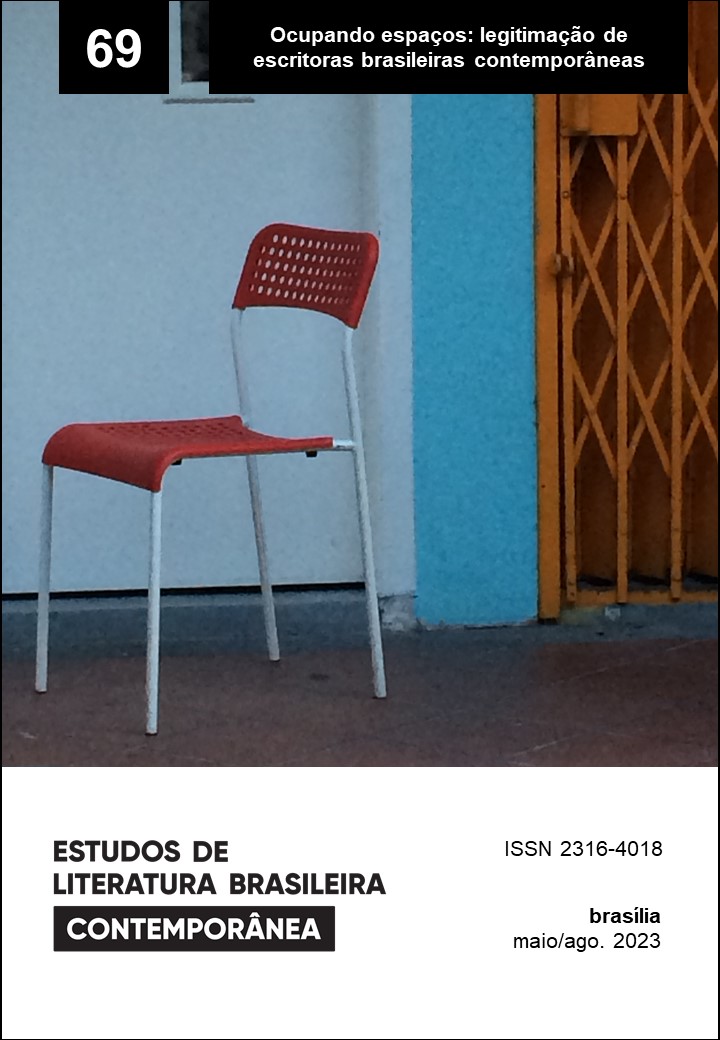Contemporary female perspectives on authoritarianism in the military dictatorship: time and space in Liniane Brum, Luciana Hidalgo, and Maria Valéria Rezende
Keywords:
female authorship; Brazilian military dictatorship; space; timeAbstract
This article aimed to analyze the contribution of contemporary female writing to the scope of literature on the Brazilian military dictatorship. Through a brief analysis of Antes do passado: o silêncio que vem do Araguaia (2012) by Liliane Haag Brum, Rio-Paris-Rio (2016) by Luciana Hidalgo, and Outros cantos (2016) by Maria Valéria Rezende, different aspects of contemporary Brazilian literature are discussed in their distinctive ways of representing the dictatorial period. Despite such diversity of styles, the spatio-temporal displacements in the narrative composition are appointed as a point of convergence between the three publications, and their relationship with the (female) narrative perspectives and their understanding of the historical and social contexts in question.
Downloads
References
ALBUQUERQUE JÚNIOR, Durval Muniz (2001). A invenção do nordeste e outras artes 2. ed. Recife: FJN, Massangana; São Paulo: Cortez.
BARBERENA, Ricardo Araújo; FERRÃO, Ana Carolina Schmidt (2020). Desvelando identidades: realismo e subjetividade em Rio-Paris-Rio, de Luciana Hidalgo. Revista Investigações, v. 33, n. 1, p. 1-12. https://doi.org/10.51359/2175-294x.2020.245169
» https://doi.org/10.51359/2175-294x.2020.245169
BRACHER, Beatriz (2017). Não falei 2. ed. São Paulo: 34.
BRUM, Liniane Haag (2012). Antes do passado: o silêncio que vem do Araguaia. Porto Alegre: Arquipélago.
CARUTH, Cathy (1996). Unclaimed experience: trauma, narrative, and history. Londres, Baltimore: Johns Hopkins University Press.
CRUZ, Fábio Lucas (2018). A História e as memórias do exílio brasileiro. Fronteiras: Revista Catarinense de História, n. 20, p. 115-137. https://doi.org/10.36661/2238-9717.2012n20.8139
» https://doi.org/10.36661/2238-9717.2012n20.8139
DALCASTAGNÈ, Regina (1996). O espaço da dor: o Regime de 64 no romance brasileiro. Brasília: Editora da UnB.
FINAZZI-AGRÒ, E. (2014). (Des)memória e catástrofe: considerações sobre a literatura pós-golpe de 1964. Estudos de Literatura Brasileira Contemporânea, n. 43, p. 179-190.
FREITAS, Sávio R. S.; MILFONT, Raíza H. S. (2022). A mulher duplamente subversiva em Outros Cantos, de Maria Valéria Rezende. Re-Unir, v. 9, n. 1, p. 106-119.
GINZBURG, Jaime (2012). A violência na literatura brasileira: notas sobre Machado de Assis, Graciliano Ramos e Guimarães Rosa. In: SELIGMANN-SILVA, Márcio; GINZBURG, Jaime; HARDMAN, Francisco Foot (org.). Escritas da violência Rio de Janeiro, 7Letras. v. 1. p. 123-135.
HEINEBERG, Ilana (2020). Exílio da ditadura na ficção brasileira da geração pós-memorial: a perspectiva e a estética dos filhos. Estudos de Literatura Brasileira Contemporânea, n. 60, e6006. https://doi.org/10.1590/2316-4018606
» https://doi.org/10.1590/2316-4018606
HIDALGO, Luciana (2016). Rio-Paris-Rio Rio de Janeiro: Rocco.
HIRSCH, Marianne (2008). The Generation of Postmemory. Poetics Today, n. 29, p. 103-128. https://doi.org/10.1215/03335372-2007-019
» https://doi.org/10.1215/03335372-2007-019
LACAPRA, Dominick (1999). Trauma, absence, loss. Critical Inquiry, v. 25, n. 4, p. 696-727.
LISBOA, Adriana (2014). Azul corvo Rio de Janeiro: Objetiva.
MACHADO, Ana Maria (1999). Contracorrente: conversas sobre leitura e política. São Paulo: Ática.
MELLO, Evelyn (2020). Literatura, feminismo e ditadura: possíveis caminhos da crítica literária para uma leitura de obras escritas por mulheres no período do regime militar brasileiro. Itinerários, n. 50, p. 37-55.
PELLEGRINI, Tânia (2014). Relíquias da casa velha: literatura e ditadura militar, 50 anos depois. Revista Estudos de Literatura Brasileira Contemporânea, n. 43, p. 151-178. https://doi.org/10.1590/S2316-40182014000100009
» https://doi.org/10.1590/S2316-40182014000100009
REZENDE, Maria Valéria (2016). Outros cantos Rio de Janeiro: Alfaguara.
SELIGMANN-SILVA, Márcio (2014). Imagens precárias: inscrições tênues de violência ditatorial no Brasil. Estudos de Literatura Brasileira Contemporânea, n. 43, p. 13-34.
VECCHI, Roberto (2014). O passado subtraído da desaparição forçada: Araguaia como palimpsesto. Estudos de Literatura Brasileira Contemporânea, n. 43, p. 133-149.
VECCHI, Roberto (2021). A crise da pós-memória e o horizonte das sobrevivências: campos de batalha da memória no Brasil contemporâneo. Estudos de Literatura Brasileira Contemporânea, n. 64, e645. https://doi.org/10.1590/2316-4018645
Downloads
Published
How to Cite
Issue
Section
License

This work is licensed under a Creative Commons Attribution-NoDerivatives 4.0 International License.
Authors who publish in this journal agree to the following terms:
a) The authors maintain the copyright and grant the journal the right of first publication, the work being simultaneously licensed under the Creative Commons Attribution License-Non Commercial 4.0 which allows the sharing of the work with acknowledgment of the authorship of the work and publication this journal.
b) Authors are authorized to enter into additional contracts separately, for non-exclusive distribution of the version of the work published in this journal (eg publish in institutional repository or as a book chapter), with authorship recognition and publication in this journal.
c) Authors are allowed and encouraged to publish and distribute their work online (eg in institutional repositories or on their personal page) after the editorial process, as this can generate productive changes, as well as increase the impact and citation of published work (See The Effect of Free Access).
d) The authors of the approved works authorize the magazine to, after publication, transfer its content for reproduction in content crawlers, virtual libraries and the like.
e) The authors assume that the texts submitted to the publication are of their original creation, being fully responsible for their content in the event of possible opposition by third parties.


